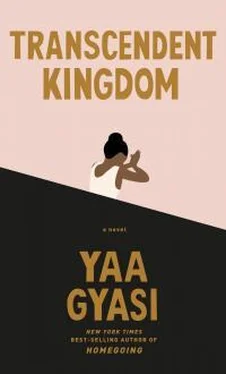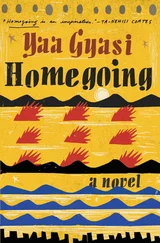I scowled at my mother as Pastor John continued to make vague references to me, but she looked straight ahead, unfazed. After the sermon, as he greeted us congregants on our way out, Pastor John squeezed my hand, a little harder than was welcome, and said, “Don’t you worry none. Your mom’s doing good. She’s doing real good. God is faithful.”
—
“You’re doing real good,” I said to the mouse as I put him down. Though I’d repeated this process dozens of times without fail, I still always said a little prayer, a small plea that it would work. The question I was trying to answer, to use Mrs. Pasternack’s terms, was: Could optogenetics be used to identify the neural mechanisms involved in psychiatric illnesses where there are issues with reward seeking, like in depression, where there is too much restraint in seeking pleasure, or drug addiction, where there is not enough?
In other words, many, many years down the line, once we’ve figured out a way to identify and isolate the parts of the brain that are involved in these illnesses, once we’ve jumped all the necessary hurdles to making this research useful to animals other than mice, could this science work on the people who need it the most?
Could it get a brother to set down a needle? Could it get a mother out of bed?
10
My mother was surprised to find herself pregnant with me. She and the Chin Chin Man had stopped trying long before. America was so expensive, barrenness was its own kind of blessing. But then there was the morning sickness, the tender breasts, the ballooning of her bladder. She knew. She was forty years old, and she wasn’t entirely happy with what everyone around her kept referring to as her “miracle.”
“You weren’t a very good baby,” she told me all my life. “In my stomach, you were very unpleasant, but coming out you were a nightmare. Thirty-four hours of misery. I thought, Lord, what have I done to deserve this torment?”
Nana was the first miracle, the true miracle, and the glory of his birth cast a long shadow. I was born into the darkness that shadow left behind. I understood that, even as a child. My mother made certain of it. She was a matter-of-fact kind of woman, not a cruel woman, exactly, but something quite close to cruel. When I was young, I prided myself on being able to tell the difference. Nana was still around, and so I could stand being told I was a horrible baby. I could stand it because I understood the context; Nana was the context. When he died, every matter-of-fact thing became cruel.
When I was very little, my mother took to calling me asaa, the miracle berry that, when eaten first, turns sour things sweet. Asaa in context is a miracle berry. Without context, it is nothing, does nothing. The sour fruit remains.
In those early years of our family of four, sour fruit was everywhere, but I was asaa and Nana was context, and so we had sweetness in abundance. My mother still worked for Mr. Thomas then. Some of my earliest memories are of his endlessly trembling hands reaching for mine on the days my mother brought me to see him.
“Where’s my little nugget?” he would stammer, the words fighting to push through the shaking door of his lips. Mr. Thomas loved my mother by then, perhaps more than he loved his own children, but his sharp tongue never dulled, and I never heard him say a kind word to her.
The Chin Chin Man had a steady job as the janitor for two of the middle schools. He was still beloved by the children, and he was a good, hard worker. My memories of him, though few, are mostly pleasant, but memories of people you hardly know are often permitted a kind of pleasantness in their absence. It’s those who stay who are judged the harshest, simply by virtue of being around to be judged.
I’m told that as a baby I was loud and chatty, the exact opposite of the quiet, shy person I turned out to be. Verbal fluency in young children has long been used as a signifier of future intelligence, and while that holds true for me, it’s the temperament change that I’m interested in. The fact that when I hear or see myself on tape from those early years of my life, I often feel as though I am witnessing an entirely different person. What happened to me? What kind of woman might I have become if all of that chattiness hadn’t changed direction, moved inward?
There are recordings of me from back then, audiotape after audiotape of my fast talking, perfect Twi or, first, my nonsense babbling. In one of the tapes, Nana is trying to tell the Chin Chin Man a story.
“The crocodile tilts his head back and opens his large mouth and—”
A shriek from me.
“A fly lands on the crocodile’s eye. He tries to—”
“Dada, dada, dada!” I shout.
If you listen to the tape closely, you can almost hear the Chin Chin Man’s patience in the face of Nana’s growing frustration and my unreasonable interruptions. He’s trying to pay attention to us both, but, of course, neither of us gets what we really want: complete and utter attention, attention without compromise. I wasn’t speaking real words yet, but still, there is an urgency to my nonsense babbling. I have something important to say. A disaster is on the horizon, and if no one listens to me the disaster will come to pass and my father and Nana will have no one to blame but themselves. The urgency in my voice is quite real. It’s distressing to listen to, even all of these years later. I’m not pretending there is an impending disaster; I truly believe that there is one. At one point, I make a low, guttural, animal sound, a sound so clearly biological in its design to elicit attention and sympathy from my fellow animals, and yet my fellow animals—my father, my brother—do nothing but talk over me. They talk over me because we are safe, in a small, rented house in Alabama, not stranded in a dark and dangerous rain forest, not on a raft in the middle of the sea. So the sound is a nonsense sound, a misplaced sound, a lion’s roar in the tundra. When I listen to the tape now, it seems to me that this itself was the disaster I foresaw, a common enough disaster for most infants these days: that I was a baby, born cute, loud, needy, wild, but the conditions of the wilderness have changed.
On the tape, Nana goes back to telling his story, but it’s of no use. I grow increasingly desperate, not letting him get a word in edgewise. Finally, you can hear a little smack, Nana shouting “Shut up shut up SHUT UP.”
“No hitting,” the Chin Chin Man says, and then he begins to speak to Nana in low tones, too low to hear on the tape, but you can still sense the anger underneath those hushed sounds. The anger has notes of understanding in it. He’s saying, Yes, she’s insufferable, but she’s ours and so we must suffer her.
—
My mother was eating again, though not in front of me. I came home from the lab a couple of times to find empty cans of Amy’s Chunky Tomato Bisque in the trash, and so I started buying loads of them at the Safeway near campus.
I wasn’t eating much myself in those days, the lean, unhealthy grad student days. My dinners all came in boxes or cans, announcing themselves by the microwave’s ding. At first, I was embarrassed about my diet. It didn’t help that the cashier I always seemed to get at my local Safeway was improbably beautiful. Dark olive skin with an undercut that I caught a glimpse of every time she tucked her hair behind her ear. Sabiha, her name tag, always crooked and fastened just above her left breast, announced. I couldn’t bear it. I started to imagine her internal responses to the contents of my shopping cart. That “Sesame Chicken Lean Cuisine for dinner again, huh?” look I was certain she’d once flashed me. I decided to spread my shopping around to different grocery stores in the area. Now that my mother was staying with me, I felt less embarrassed about the soup cans overflowing in my cart. If anyone asked, I was armed with an excuse. “My mother, she’s ill,” I imagined myself saying to that beautiful cashier.
Читать дальше












